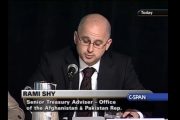
Daniel Van Pelt, a former member of the New Jersey State Legislature, has been given 41 months in a federal prison for accepting at $10,000 bribe to help a developer get the environmental permits needed for construction along the coast of New Jersey. Undercover FBI informants provided the evidence needed to convict Van Pelt.
The legislator was handed an envelope stuffed with $10,000 in cash, and he said, coyly, “I’ll hold on to it. I don’t know what I’m going to do with it.” The legislator tried to characterize the payment as a consultant fee, but whatever legal protection Van Pelt believed that mysterious statement would provide him, it did not prevent him from being sentenced to federal prison. Van Pelt’s arrest and conviction were part of Operation Big Rig, an attempt to crack down on public corruption that resulted in the arrest of 44 other public officials in the nation. A member of the Sierra Club of New Jersey warned that because of politicians, “We are loving the bay to death with development.” He bemoaned the exceptions being granted when money was offered to politicians.
The fundamental problem with public corruption is that it will occur when government intrudes too much into our lives. Why should developers need environmental permits in order to build on property they own? The property in question in Van Pelt’s case was coastal property. The private owner of the property and the firm developing the property for commercial use would have much greater interest in preserving the beauty and the attraction of the site on Barnegat Bay than bureaucrats in Trenton.
Also, the curious might wonder: What would have happened if Van Pelt had accepted a large campaign contribution, instead of his “consulting fee”? Or what if he had been offered a cushy job after he left the legislature? He would not have gone to prison. He might, in fact, have risen up the political structure in New Jersey to higher places of power (especially if he had also been able to funnel campaign funds to other members of the legislature). Is that not what congressional leaders in Congress have done for a long time — offering campaign funds from various unusual sources to members of Congress who need funds to win reelection? How many members of Congress, after leaving office, go into “consulting” or head important organizations that need political help? Perhaps a better question might be: How many politicians, after they leave politics, open a grocery or a software company or an insurance business rather than stay connected to politics?
Government is inherently corrupting. The vast majority of the corruption — the abuse of power that those in the center of political power exercise — is hidden and is much more costly than a bribe of $10,000. The way to end corruption in government is to reduce government to its logical lowest level of operation, but that is not something that FBI investigators or reporters who feast on corruption stories are likely to propose in the near future.
Photo of Barnegat Bay: AP Images



